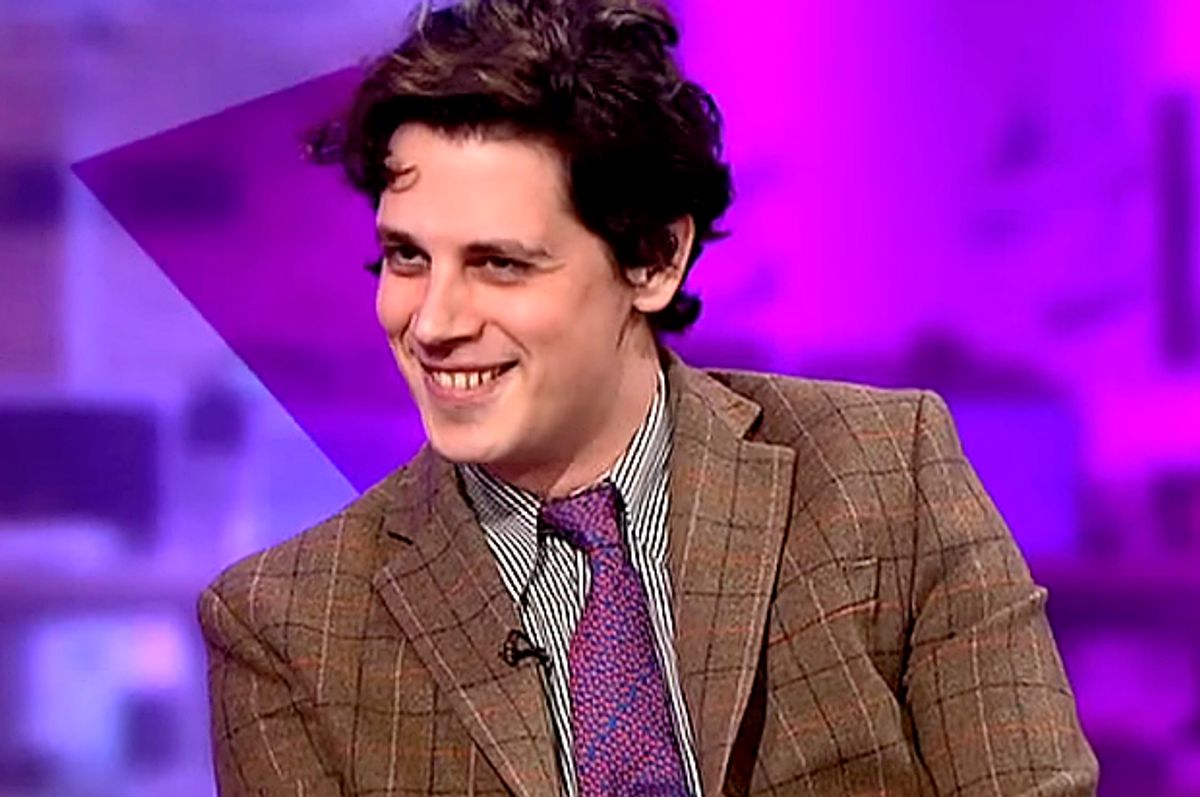You can argue whether Twitter played it right with Milo Yiannopoulos, Brietbart's notoriously inflammatory tech editor. Just do freedom of speech a favor and don't call it censorship.
Yiannopoulos is well known around social media for his fierce advocacy of the trolls of GamerGate — who hide behind the phrase "ethics in gaming journalism" to harass and abuse women on Twitter and elsewhere with relative impunity. A profile for Fusion last fall described him as "utterly charming" in person -- despite being "the ultimate troll." In it, he stated that "My natural disposition is a satirist and a comic. I like to entertain and to please people." And he added that at a certain point in his career he decided, "I didn’t like me very much and so I created this comedy character. And now they’ve converged."
But though he says he likes to "entertain," he also admitted to the LA Times last October that "I enjoy upsetting the right people. I love poking fun at earnest censors. I want to push the bounds of what can be said on the Internet." Last fall, he was booted from an LA Slutwalk event when he showed up brandishing a sign that read "Rape culture and Harry Potter: Both Fantasy." And earlier last year, after a female journalist was punched in a random Brooklyn street attack, he wrote on Breitbart, "I can’t imagine why anyone would want to punch her in the face. Well, actually, I can." On his personal site, he describes himself as "the most fabulous supervillain on the Internet."
You'd think a guy like that would revel in any form of evidence of his "supervillain" status. But when Twitter recently removed his verification checkmark, he was not pleased at all. As Buzzfeed reported over the weekend, the drama seems to have arisen from an exchange in which Yiannopoulos got into with another user, who at one point asked, "Milo could you tell your creepy weirdo misogynist followers to maybe take a shower and get a life instead of harass me online?" He replied, "You deserve to be harassed you social justice loser." Soon after, he received a message that "Due to recent violations of the Twitter rules, the verified badge has been removed from your account." He tells Buzzfeed, "They’re using a tool for establishing the identity of prominent people as an ideological weapon."
A verification badge is a nice Twitter status symbol, a sign that the person who wears it has an important presence and a degree of authority in the community. Having it taken away is certainly an obvious shaming tactic, a way of saying, "On second thought, you're not so legit." But the checkmark also prevents trolls from impersonating someone and wreaking whatever havoc possible. Just last week, a tweet in which Oregon militia leader Ammon Bundy seemingly compared himself to Rosa Parks was revealed to be a hoax.
But say what you will about Twitter's choice — as opposed to say, ignoring the post, or kicking the guy out like they did with the sad, angry Chuck Johnson last year — what Twitter has not done has been to remove any posts or suspend or ban Yiannopoulos. He's not been censored. Yet the Wall Street Journal chose to frame its reporting of the incident as a "freedom of speech debate," and the Guardian called it Twitter's "free speech conundrum." The Week, meanwhile, went all out, asking, "Why is Twitter punishing conservatives?" and reporting, "Under the guise of cracking down on 'harassment,' Twitter has done things that look increasingly like regulating speech." In the process, by the way, Yiannopoulos has racked up a bevy of new followers, and the whole dustup has sparked a self righteous #JeSuisMilo hashtag, because sure, losing your checkmark is totally like being the victim of terrorism.
Did Yiannopoulos deserve to have his precious checkmark yanked away? I don't know; should he have had it in the first place? Should anyone? More to the point, who cares? As Yiannopoulos once said of atheists, "This is a privileged group in society that I find it funny to take the mickey out of, because they are so touchy."
It's not that how people conduct themselves on Twitter doesn't matter. What people say there — and what they are permitted to say — does. These issues are hashed out daily in debates over the line between free speech, and threats and abuse. Online community moderation is tough work, and making the call between a protected if unpopular statement and one that that is unacceptable is not always clear. That's not, however, what happened here. Yiannopoulos is no more being censored than a person who's been blocked is — though similarly inane arguments about the "free speech" issues around shared block list tools have been made. But in the same way now, no one's shutting down the conversation. A lack of a checkmark or a click of the block button is just a way of saying, we choose not to validate what you're doing here. And it's interesting that the controversy seems to have started with Yiannopoulos' own declaration regarding what another individual "deserves" from Twitter. He's learning that's still up to Twitter to decide.


Shares